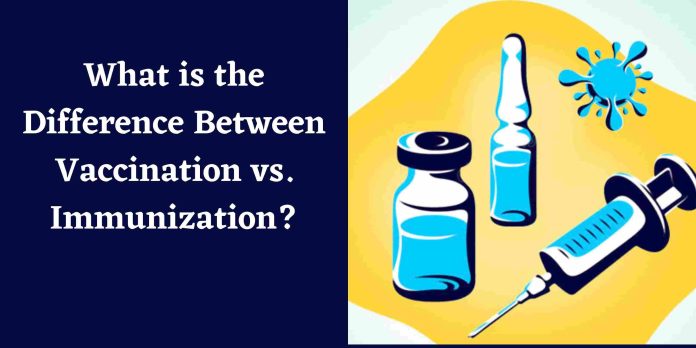Introduction:
A vaccine, Immunization, or inoculation is a term used for the same thing. However, they all have different meanings. At first glance, these discrepancies may not seem necessary. However, it’s still possible to have a wrong conversation with your doctor if you speak the right way. So, you should know about the basic difference between vaccination vs. immunization.
Vaccines:
When affected, People get vaccines to protect themselves from a particular disease. When it comes to making vaccines, vaccinology is the field’s name. Most of the time, it’s made from the poisons and proteins of dead or weak microorganisms that have died or have died off.
Smallpox was an excellent thing to get rid of all over the world. Other uses include protecting against polio, tetanus, and the SARS virus. In addition, people vaccinated against about twenty-five diseases that can be prevented now have permission from the World Health Organization (WHO).
Immunization
Antibodies against a particular disease take about two weeks to complete. When immunogens are used to make someone’s immune system more robust, the process is known as “immunization.” Long-term benefits of Immunization can be linked-to following up with a vaccine. So, it’s saved many lives around the world.
Types Of vaccines:
After getting vaccinated, there are both live and weak bacteria. A few of them are attenuation, and one of them is All you need to know is that vaccines are used to help your body build a strong and long-lasting immune system, which is why they are given to you. In this case, the vaccine has been diluted.
Vaccines are turned off.
Inactivated vaccines are different from attenuated vaccines because their pathogens have been killed. In a controlled environment, these pathogens are killed to be less infectious and spread less quickly. However, the immune system is less intense after being vaccinated, so more “booster” doses are needed to protect against a specific disease.
The Toxoid Vaccine:
These after vaccines aren’t made from infections, but poisonous substances that make people sick, so they don’t work well. After getting a vaccine, like the ones for tetanus and diphtheria, this type of vaccine is used.
Getting vaccinated against Subunits:
So one way to treat hepatitis B and other infections with this vaccine is to get a shot. These vaccines don’t contain the whole virus but only the antigenic parts. However, it takes a lot of “booster” shots to build up the level of immunity needed; it does work.
Immunization: There are different types of vaccination.
Active and Passive Immunization.
Treatment for infections
- When someone’s immune system reacts to an antigen, it is called an antigen-induced immune system.
- Touching a disease-causing microbe can make the body’s defenses overdrive.
- A person can be passively immunized when they don’t get a vaccine.
- For a short time, antibodies are given to a person who hasn’t been immunized. They can fight off a disease-causing microorganism. If you get a vaccine this way, your body will be able to break down the antibodies on its own after you get it.
Immunization and vaccination are the order of the day, so people need to get them.
- After getting a vaccine, a person’s body will be able to fight off a specific germ and not get sick. Smallpox was an excellent thing to get rid of all over the world. Other uses include protecting against polio, tetanus, and the SARS virus.
- Immunization can also help a person’s immune system by giving them immunogens. Antibodies against a particular disease take about two weeks to make. There are many ways to provide Immunization. To be vaccinated, you need to be immunized.
The WHO says:
- To help the body fight disease and infections, the purpose of vaccines are used.
- The disease can be made less dangerous to you by giving you a vaccine, for example, or by having an injection to make you more resistant to the disease.
In what way does it get there?
- After a vaccine, it can be given either orally or intravenously. It can also be squirted into your nose for a more substantial effect.
- As for vaccination, it must be given this way. Illness- or disease-resistant is just a process.
How does it work?
- If you get a vaccine, you may not always be able to avoid getting a disease. For example, vaccines like Imax Rabies only protect against rabies, but they don’t protect against the virus.
- Some people become entirely immune to the microorganism if they are exposed to it and get better. This is because antibodies help the body fight off a specific type of disease. For example, if a person receives rabies and gets better, they will be completely safe from the disease.
In terms of time:
- As long as the diseases or microorganisms that cause disease keep changing, vaccinations don’t do any good.
- You might get sick because your body doesn’t have the right microbes to fight off disease. Because of this, there isn’t a vaccine to stop colds.
Conclusion:
Afterward, it is also possible to make it. When immunogens are used to make someone’s immune system more robust, the process is known as “immunization.” An active immunology term is used to describe this kind of thing. To be actively immunized, you need to get a vaccine. We hope you have come to know the purpose of vaccines. Consider this Article as a source of information for future reference.
Apart from that, if you are interested to know about Scientists Have Found That Exercise Literally Revitalizes Our Brain then visit our Daily bites category.
Autor Bio:
Naman Modi is a Professional Blogger, SEO Expert & Guest blogger at wilmingtonurgentclinic.com. He is an Award-Winning Freelancer & Web Entrepreneur helping new entrepreneurs launch their first successful online business.
Social Media Links Below:
Twitter– https://twitter.com/LAUrgentCare
Facebook- https://www.facebook.com/Los.Angeles.Urgent.Care.Wilmington

















